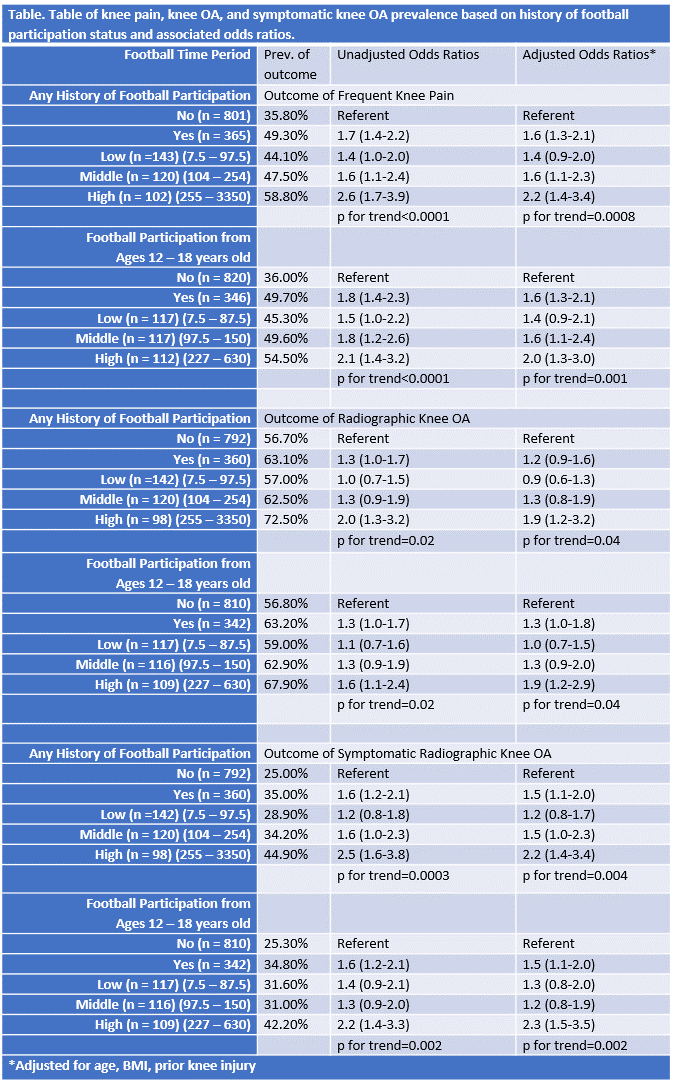Session Information
Session Type: ACR Poster Session A
Session Time: 9:00AM-11:00AM
Background/Purpose:
Male youth commonly participate in American football. Little data inform whether this is associated with knee pain or osteoarthritis (OA) later in life. We aimed to evaluate the relationship of football participation with these outcomes using data from the Osteoarthritis Initiative (OAI), hypothesizing that it is associated with a higher prevalence of knee pain, knee OA, and symptomatic knee OA.
Methods:
This is a retrospective cross-sectional study of OAI participants with knee x-ray readings, symptom assessments, and completed surveys on lifetime physical activity. A modified version of the Historical Physical Activity Survey Instrument identified those who played football. Posterior-Anterior semi-flexed knee radiographs were scored for Kellgren-Lawrence (KL) grade (0-4). Radiographic OA (ROA) was defined as KL ≥ 2. Frequent knee pain within a person required at least one knee to have frequent knee pain. Symptomatic radiographic OA (SOA) required that at least one knee had both ROA and frequent knee pain. Anyone with a total knee replacement was classified as having frequent knee pain, ROA, and SOA.
Since 98% of the subjects who participated in football were men, we restricted this study to men only. Using logistic regression, we evaluated the association of any history of football participation during 2 age periods: ages 12 – 18 and over the participants’ lifetime, with the prevalence of ROA, frequent knee pain, and SOA as the outcomes. Outcome Definitions. All outcomes were person-based definitions. Exposure Definitions. For the 12-18 age range and any history of American football participation, we looked at the exposure in two ways: (1) dichotomously (non-participants versus participants) and (2) 4 groups: non-participants and 3 levels of participation (low, medium, and high tertiles of football participation). The Cochran-Armitage trend test was used to evaluate for a dose response relationship. We performed analyses both unadjusted and adjusted for age, BMI, and history of knee injury.
Results:
1166 men were included with a mean age of 63.7 (SD 9.2) years and BMI of 28.6 (SD 4.2) kg/m2. 31% (365/1166) played football at some time in their lives, 95% (346/365) played between 12-18 years old, with 65% (223/346) playing at least 5 years during that age range.
The ORs for SOA from lowest to highest football participation were 1.2, 1.5, and 2.2 respectively (p for trend = 0.004) (Table). Findings were similar for football from ages 12 – 18 years and for outcomes of knee pain and ROA (Table).
Conclusion:
This is the first large epidemiologic study to suggest that football participation, especially in the teen years, is detrimental to knee health, independent of knee injury. A limitation to this study is that the exposure of football was ascertained retrospectively. Prospective studies evaluating football players are warranted.
To cite this abstract in AMA style:
Lo GH, McAlindon TE, Kriska A, Price LL, Rockette-Wagner B, Mandl LA, Eaton CB, Hochberg MC, Jackson RD, Kwoh CK, Nevitt MC, Driban JB. Participation in American Football Is Associated with Increased Risk for Knee Pain and Osteoarthritis: Data from the Osteoarthritis Initiative [abstract]. Arthritis Rheumatol. 2018; 70 (suppl 9). https://acrabstracts.org/abstract/participation-in-american-football-is-associated-with-increased-risk-for-knee-pain-and-osteoarthritis-data-from-the-osteoarthritis-initiative/. Accessed .« Back to 2018 ACR/ARHP Annual Meeting
ACR Meeting Abstracts - https://acrabstracts.org/abstract/participation-in-american-football-is-associated-with-increased-risk-for-knee-pain-and-osteoarthritis-data-from-the-osteoarthritis-initiative/

